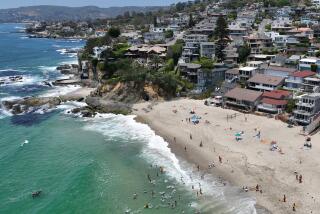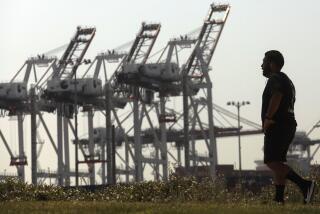Taking Responsibility for Those Polluted Sites : Eco-tourism: It’s time for the travel industry to step forward and address the serious environmental problems caused by its own spiraling growth.
- Share via
What happens when the interests of tourism conflict with the environment? It’s something to think about today on Earth Day.
It is projected that by the year 2000, $2.75 trillion will be spent by travelers taking at least one trip a year.
Two interesting, and somewhat disturbing, examples of what can happen when tourism development seems to have taken precedence over environmental concerns are Hawaii, long a tourist favorite, and Thailand, enjoying its first substantial tourist boom.
For three decades, Hawaii has been the No. 1 island vacation spot in the United States. Last year it had a record-breaking year for tourist arrivals. But what started out as massive hotel development in Waikiki has spread to the neighbor islands of Hawaii, Kauai and Maui.
Mega-resorts are popping up almost everywhere, causing a serious impact on the environment--water, electrical and sewage capacities are being reached.
Thousands of hotel rooms are being built on the Kona Coast of the Big Island, near Poipu Beach in Kauai and in Wailea on Maui. More golf resorts are also being constructed.
“When it comes to tourism and the environment,” said Kauai Mayor Joanne Yukimura, “there’s been no long-range planning. We need to slow down. We’re already at capacity at our sewage treatment plants.”
Then there is the problem of traffic. For the first time that any local can remember, there have been traffic jams on Kuhio Highway. And the same thing is happening on Maui.
Also, on the Big Island of Hawaii, the massive 1,241-room Hyatt Regency Waikoloa consumes too much for most items to be bought locally.
For example, if a guest orders a “fresh” salad at the hotel, a large plastic bag is popped open in the kitchen. The vegetables for that salad are washed, pre-cut, chopped, vacuum sealed and shrink-wrapped in California, then shipped to Hawaii in large containers.
Thailand is enjoying a booming economy and unprecedented tourist growth. This has resulted in tremendous congestion in such cities as Bangkok, where the air pollution problem (Thailand has no emissions standards for autos) has continued to worsen in the last few years.
Bill Black, general manager of Bangkok’s Regent Hotel, did some checking and found that 3,000 municipal buses were serving the city. Each belched out thick diesel smoke that was high in irritants and particulates.
“I discovered that there is a special pollution control converter on the market that will help with exhaust fumes,” Black said. The cost is about $1,000 each. The solution: Black has proposed that each major company, hotel or airline in Bangkok “adopt” a bus--invest $1,000 and buy a converter.
“It’s in everyone’s best interests to do this,” he said. “And why shouldn’t it be the people who profit from tourism who work to protect the very environment that attracts tourists in the first place?”
Even if Black’s bus adoption program is started, there is much more work to be done in Thailand.
In some areas, the environmental problems already have reached a crisis stage. Some Thai forests are being devastated in the rush to support a booming wooden crafts and souvenir industry.
On the beaches, seashells and coral are being harvested at such rates that marine life and coral reefs are endangered.
At the beach resort city of Pattaya, the water is being polluted by dozens of beach hotels that have been built with little or no regard for sewage and water treatment systems. (A recent survey of 106 Pattaya hotels and guest houses showed that only 37% met minimum standards.)
There have been periods in Pattaya where the water has been too polluted for swimming.
Despite the problems, the number of visitors continues to increase. In 1988, Thailand’s revenue from tourism amounted to 15% of the country’s total export earnings, a 50% gain from 1987. (Last year’s figures are expected to show similar growth.)
“With that kind of income,” said one Thai hotelier, “everyone sees dollar signs, and they develop and develop properties. The government tells us that one job is created in tourism for every nine foreign tourists. So the incentive is there to build. But where is the incentive to build prudently, or to preserve?”
And, for the first time, it also is worrying the government. The Tourism Authority of Thailand, the official government agency, has listed the environment as a “problem and obstacle” in its 1990 annual marketing plan report.
Thailand and Hawaii are not alone as popular destinations where the tourism industry is confronting serious environmental problems of its own making.
Even so, developers and hotel owners can help turn a potentially devastating environmental problem around.
Already there has been some progress. Some hotels in Thailand are installing proper water and waste treatment systems.
At the Nelson Hotel in Norwich, 100 miles northeast of London, officials are offering “pollution weekends”--visits to nearby forests and endangered marshes. And if guests arrive in cars fueled by unleaded gas, they get a 10% discount.
In Hawaii, many communities are starting to fight the big developers, imposing new rules and restrictions on previously unchecked growth.
In other parts of the world, some tour operators are responding to American tourist concerns for the environment. Seattle-based Society Expeditions has adopted a code of travel ethics for its tours to the Antarctic.
Cambridge, Mass.-based Overseas Adventure Travel is a company that promotes “low impact” travel. Its tours are known for being exacting on camp sanitation, for cooking with liquid fuel only in deforested areas and for limiting the number of passengers on each trip.
In Honolulu, local government has banned snorkel-tour operators from using the marine preserve at Hanauma Bay. (Hanauma Bay is a sunken crater 12 miles from Waikiki. Last year it drew 10,000 visitors a day, 8,000 more than the government claims as its capacity.)
In Costa Rica, the government recently gave protection to an additional 355,000 acres of land, adding to what is already the world’s largest national park and reserve system.
Even an airline is getting into the act. When Virgin Atlantic Airways starts service to Los Angeles on May 16, its planes will be equipped with biodegradable duty-free bags, natural toiletries and a promise: For every Los Angeles passenger who flies the airline this year, Virgin Atlantic will plant a tree somewhere in California.
Much more, however, needs to be done. But it won’t happen unless the developers, the hoteliers, the airlines and the governments hear from you.
Never forget that your financial impact as a visitor speaks louder than anything else. The next time you go anywhere, think about what happens when you flush a toilet, or where the garbage goes, or if the taxi you’re riding in has emissions controls.
Ask about it. Complain if you must. It’s safe to say that the business of tourism depends more on your return visit than on your first. They want you to come back, and you should make it clear that you will . . . if you can swim in their water and breathe their air.
More to Read
Sign up for The Wild
We’ll help you find the best places to hike, bike and run, as well as the perfect silent spots for meditation and yoga.
You may occasionally receive promotional content from the Los Angeles Times.






